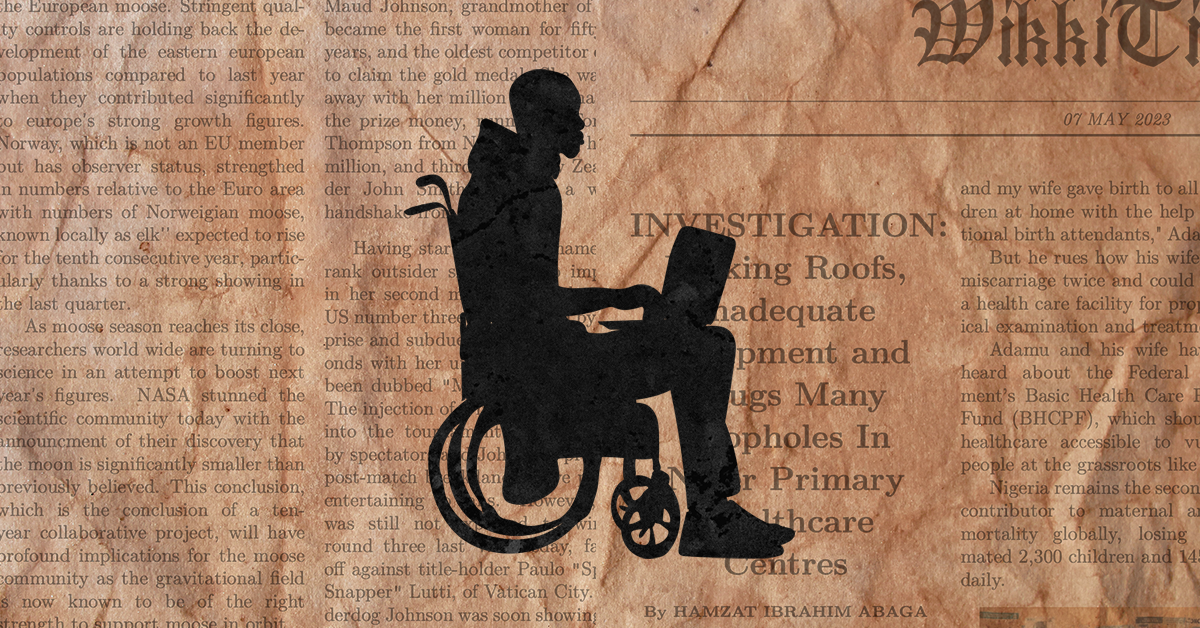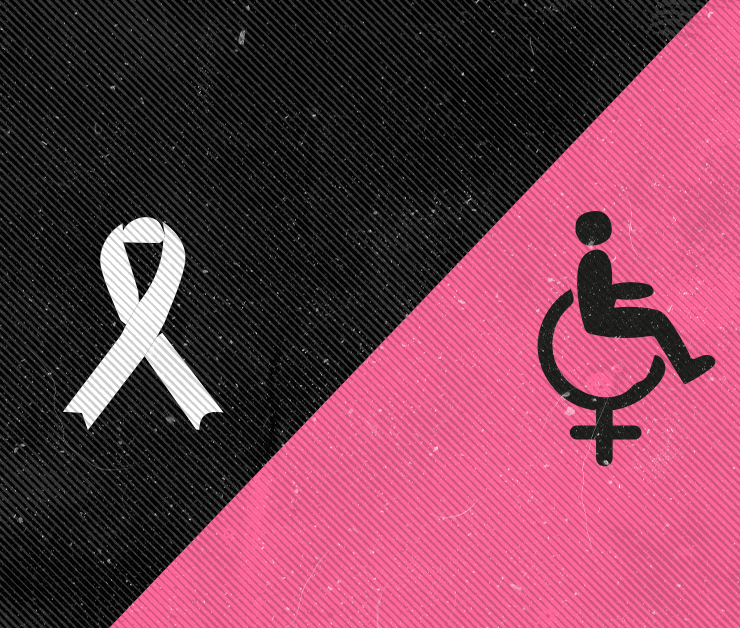“Despite the barriers”: The Nigerian journalists trying to change an ableist media landscape
- Precarious work environments across the media continue to put journalists living with disabilities in a hard to navigate position. Yet from starting their own platforms to insisting on policies that accommodate them, here is a look into how these journalists are resisting.

In 2018, Gbenga Ogundare, a veteran journalist, started a news media platform Equality Reporters following the discrimination he faced after he lost his sight. Before going blind from complications arising from glaucoma in 2009, Ogundare says he used to be treated with respect by his colleagues and the people he encountered along his professional journey. In the end, he had to resign and forge his path.
“Living with a disability in Nigeria often means a sentence to a lifetime of stigma and discrimination, including employment inequality,” he says. “And personally, I suffered from these forms of negative social stereotypes the moment I lost my sight.”
Precarious work environments continue to put journalists living with disabilities in a hard to navigate position. Equality Reporters primarily focuses on stories about people with disabilities. The platform also presents a safe space for all reporters, living with or without a disability to practise their profession without discrimination. For Ogundare, who has been practising journalism for the last 20 years, barriers are meant to be a leverage to greater exploits.
“[I can] see how the voices of persons with disabilities have suffered neglect in mainstream newsrooms in Nigeria over the decades, and this was the injustice I sought to redress when I carved out my niche reporting strategy,” he tells Minority Africa.
In 2019, he exposed how an under-staffed Lagos judiciary has been unable to guarantee timely justice for rape survivors in the state. He has also investigated and exposed how communication barriers aggravate the gender-based violence experiences of women and girls with auditory disabilities in the police stations and courts in Nigeria. Away from disability reporting, he has equally exposed how a conglomerate poisons an entire community with its mining and cement production business in a southwest state.
Like Ogundare, Hamzat Abaga, an investigative reporter living with a mobility disability with WikkiTimes, has published numerous stories that hold the government to account.
Abaga, who started as a campus journalist, notes that working as a physically disabled journalist has affected him in so many ways. “You know in Nigeria when you are physically [disabled], there is this ideology that you can’t be productive. People look at you and say you can’t do the work compared to those who are fit. ”
From reporting for national dailies to freelancing with international platforms, he explains that the passion has kept him growing, adding that “the growth is immense, as well as the impact.”
According to Media Diversity Institute, journalism is about people and if journalists like Abaga are abandoned in the newsroom, they would not be able to measure up. The World Health Organization (WHO) reports that approximately 15% of the global population have some form of disability but while there are no relevant statistics that capture journalists that live with disabilities like Abaga, they are still determined to tell important stories.
Circumventing the barriers
As a teenager in secondary school, Abaga was involved in an accident which claimed his legs. He believes that the way “to challenge misconceptions about journalists living with disabilities is to do [the work] rightly.”
“When I am doing my job, I don’t see myself as disabled. I see myself as someone who can do whatever those that have two feet can do,” Abaga says. He works from home and uses fixers anytime he has to pursue investigative stories.
In July 2022, Abaga did a special report for WikkiTimes about a community in Niger State where nothing works, spotlighting the challenges of the people. In October, he reported on how inadequate equipment and drugs mar the federal government’s Basic Health Care Provision Fund (BHCPF) delivery in Niger State. In November, he told the story of how women living with Vesicovaginal Fistula (VVF) and Obstetric Fistula (OF) in Bauchi State are being neglected by their families amid stigmatization by the public and, in January 2023, he also did a story of how a Nigerian-based radio is raising awareness around injustice for International Journalists’ Network (IJNET).
“I want to stand out in my doings. I travel long-distance to investigate. I can’t sit at home, who will feed me? I stand up on my feet and do what I have to do, despite the barriers.”
Yusuf Adua, a freelance journalist with the International Center for Investigating Reporting (ICIR) and the News Editor of a local media and a strabismus patient, like Abaga and Ogundare, says he doesn’t see himself as disabled. “It has gotten to a point where I like the blacklash that I get.”
Adua, who has a sight impairment, started as a full-time investigative journalist in 2022 and is telling important stories. In October 2022, for ICIR, he published an investigation on how a multi-million bus project has been abandoned as residents continue to grapple with a transportation crisis in a southwest state. This January he also exposed how a radio project in the southwest has been abandoned by two successive governments despite continuous budgetary allocations. All these “even as people [continue to] look at you like why are you even doing this. You should be in your house and all that,’’ Adua says. To date, Adua has authored five investigative reports across national dailies.
But not all journalists living with disabilities have had success in their careers. Tomisin Adeyefa is a visually impaired journalist and sound engineer in the broadcast space who despite her talent has found it difficult to get a job. “I have tried all things possible to no avail. Sometimes I’m called for interviews, commended for doing well but refused the job because of my disability. You will hear statements like we do not have provisions for people like you.”
“I’m forced to ask them to allow me [to] work for free for a while,” says Adeyefa. At present, she freelance with a local media that pays her N2500 ($5.43) per episode that she attends on a show and “the money could hardly cover for my transportation.”
Adeyefa, not wanting to give up says, “I just keep on out of passion and hope that one day, I will get something substantial.”
EDITORS’ PERSPECTIVE
The editor of the International Centre for Investigating Reporting (ICIR), Bamas Victoria, says that the ICIR has consistently worked with journalists with disabilities to propagate its inclusiveness policy.
“[We propagate our] inclusiveness policy by ensuring that it carries along a diverse range of people; religion, gender, PWDs in its recruitment process,” she says, adding that the centre “also actively encourages the representation of women and minority voices as well as hold sessions and trains its staff on the need for inclusiveness.”
Victoria further notes that journalists that fall under this category should prioritize looking for media houses or grants that are focused on inclusiveness. “These kinds of grants are more likely to take into cognisance the challenges faced by such journalists and make provisions to mitigate it.”
Yakubu Muhammed, the head of the newsroom at WikkiTimes, says that the organization goes for serious work. He notes that irrespective of the physical challenge, they prioritize potential.
“We go for serious hats. Once we are able to identify you in telling good stories, we give them [journalists] every support they need,” Muhammed affirms.
And respect for their work as professionals is what journalists like Ogundare are seeking. In 2020, Ogundare was awarded the overall prize as the Judiciary Reporter of the Year 2020 at the Diamond Award for Media Excellence and the Child-Friendly Reporter of the Year 2016 in the same award. He also picked the Etisalat Prize for the Most Innovative Reporter of the Year 2012 at the Nigeria Media Merit Awards (NMMA).
Ogundare is not deterred. He continues to tell these stories despite colleagues looking down on him. “Majority of them wouldn’t understand why a blind person like me would insist on remaining a journalist. Some even sit beside me and refuse to say hello because they erroneously think that being blind also means that you are deaf and can’t recognise voices.”
Edited and Reviewed by PK Cross, Uzoma Ihejirika, and Caleb Okereke.






